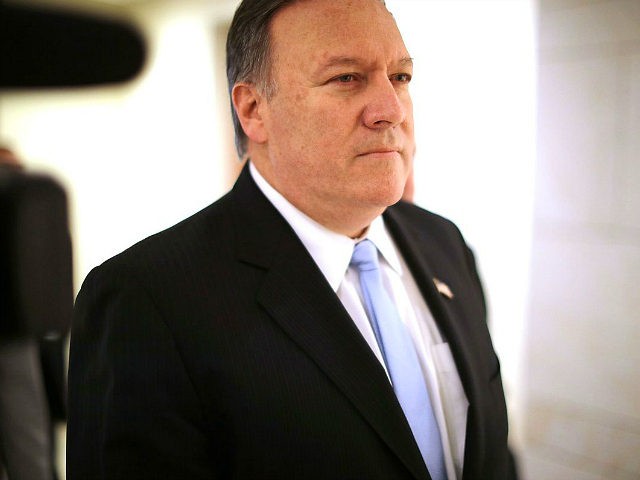In July 1971, President Richard Nixon’s National Security Advisor, Henry Kissinger, secretly flew from Pakistan to Beijing. Kissinger’s negotiations led directly to Nixon’s historic visit to China some months later.
Nixon had reshuffled the diplomatic deck and played the China card. As a result, the strategic calculus that had governed the Cold War for decades underwent a tectonic shift in America’s favor.
Now we learn that CIA Director Mike Pompeo secretly met with North Korean dictator Kim Jong-un on Easter weekend. President Trump has confirmed that Pompeo’s negotiations have laid the groundwork for a summit in late May or early June to discuss the rogue state’s nuclear weapons program. “Denuclearization would be a great thing for the world, as well as for North Korea,” the President tweeted.
Like Nixon, Trump is boldly reshuffling the deck. And, in like manner, the strategic calculus that has governed the standoff on the Korean Peninsula for decades is starting to shift in our favor.
In January, Kim Jong-un suddenly agreed to talks with the South, and in February sent a team to South Korea’s Winter Olympics. The first summit between South Korean President Moon Jae-in and Kim will take place on April 27. In a further surprise, the North Korean dictator has apparently agreed to discuss formally ending the Korean War, which began when his grandfather, Kim Il-sung, invaded the south some 68 years ago.
The most startling news is that Pyongyang, according to South Korea’s president, has just agreed to Trump’s demand for “complete denuclearization.” And this without any strings attached, such as the withdrawal of American troops.
Kim Jong-un was even galvanized — again by Trump, of course – to venture beyond the borders of his hermit kingdom for the first time since assuming power in 2011. In late March, Kim visited his chief international patron (and fellow president for life), Chinese President Xi Jinping.
According to the Nikkei Asian Review, Xi talked to Kim about the ongoing power struggle between the U.S. and China, and what it means in the context of something called “Project 2035.” Project 2035 is a grand scheme for building China into a “great modern socialist country” by the year 2035. Announced at last October’s National Party Congress, its goal is a China that is stronger in both economic and military terms than the United States.
Why would Xi share his “China Dream” of one day becoming the world’s dominant power with Kim? Perhaps to remind him that at the present time, in the face of renewed U.S. confidence, economic growth, and military resolve, it is better to be conciliatory with Trump. “I’m playing the long game,” he may have suggested to Kim. “You should, too.”
None of this would have happened if the hapless Hillary Clinton had been elected. Like previous American presidents, she would probably have tried to once again bribe North Korea into behaving itself. And like previous presidents from her husband on, she would have only thereby encouraged further extortionate behavior.
It is Trump’s toughness that has gotten us this far. Instead of bribing North Korea to suspend its weapons and missile programs, he is choking it (and its giant neighbor to the north) with ever-tightening sanctions.
Bolstering the sanctions regime is the threat of military action, made credible by the near-annihilation of the Islamic State and the surgical strikes in Syria, among other things. Young Kim knows that, if a denuclearization agreement can’t be hammered out, that he might wake up one morning to find his nuclear and missile facilities a smoldering ruin.
We used to say that only Nixon, with his strong anti-communist credentials, could have gone to China.
It may well turn out to be the case that only Trump, with his steely resolve, can broker a deal with Kim.
It is still early days, but the end of the Korean War and the denuclearization of the Korean Peninsula would fundamentally change the strategic calculus of East Asia.
Of course, Nixon going to China was not an unmixed blessing. Although the U.S.-China détente increased the pressure on the Soviet Union while helping hundreds of millions of Chinese escape poverty, it also contributed to the rise of a Chinese Party-State that is increasingly hostile to everything America stands for.
In the case of North Korea, our goal must be to (1) convince Little Rocket Man to give up his dangerous toys and (2) reconcile himself to living with his southern neighbors in peace. In so doing, we should be careful not to strengthen his despotic regime which – with or without nuclear weapons and ballistic missiles – will continue to repress its own people.
With the North Korean threat off the strategic chessboard, America and its allies can focus on the real danger to the present world order: China itself.
Steven W. Mosher is the President of the Population Research Institute and the author of Bully of Asia: Why China’s Dream is the New Threat to World Order (Regnery).

COMMENTS
Please let us know if you're having issues with commenting.